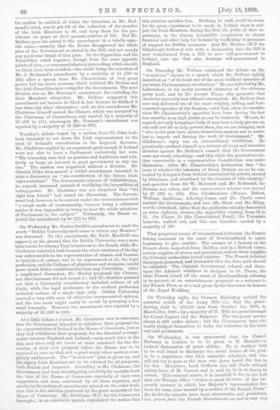Tuesday's debate began by a motion from Sir John Lub-
bock intended to cut down the Irish representation to the level of Ireland's contribution to the Imperial Revenue. Mr. Gladstone replied by an argument good enough if Ireland were not also to have a Parliament exclusively her own. "The labouring man had as genuine and legitimate and rela- tively as large an interest in good government as any one else." The motion was negatived without a division. Sir Charles Dilke then moved a verbal amendment intended to raise a discussion on "the constitution of the future Irish representation." The Government scheme of redistribution, he argued, increased instead of rectifying the inequalities of voting-power. Mr. Gladstone was not surprised that "his right hon. friend" had raised the discussion. The Govern- ment had, however, to be content under the circumstances with a rough mode of workmanship, because being a collateral matter it was impossible to bring to bear the whole attention of Parliament to the subject." Ultimately, the House re- jected the amendment by 30 (212 to 182).


































 Previous page
Previous page